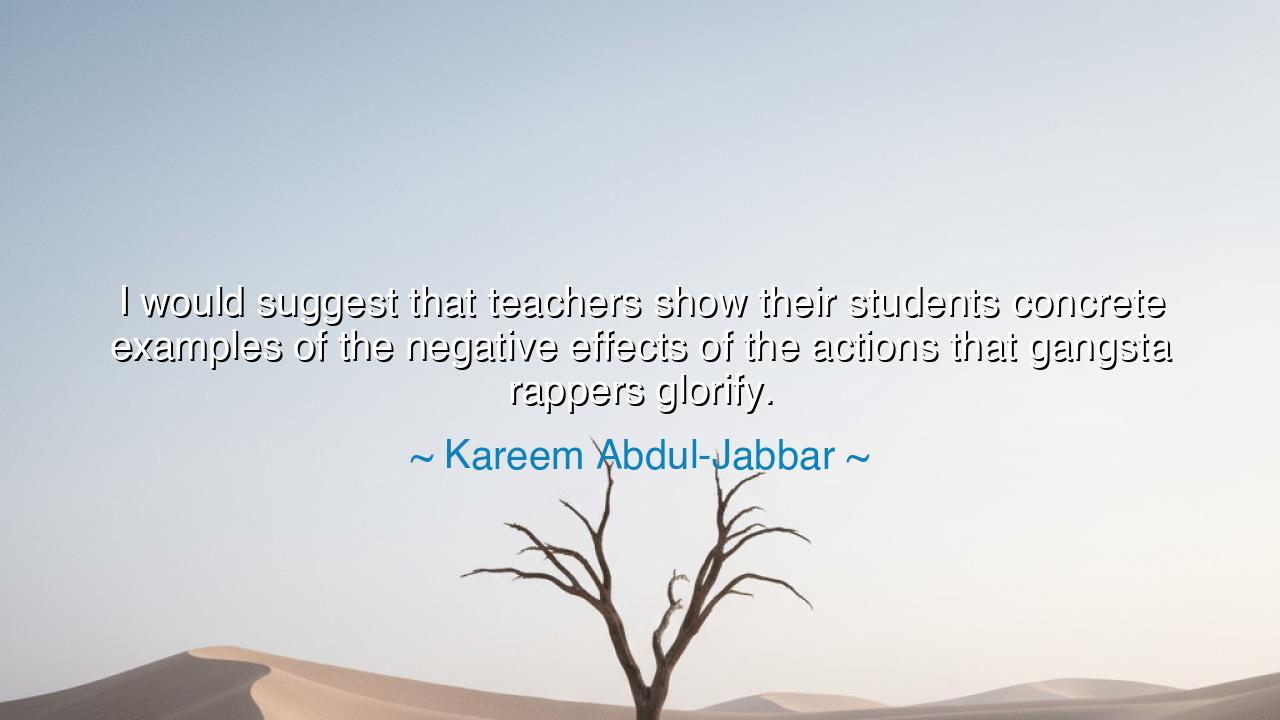
I would suggest that teachers show their students concrete
I would suggest that teachers show their students concrete examples of the negative effects of the actions that gangsta rappers glorify.






Hear the wisdom of Kareem Abdul-Jabbar, not only a master of the court but also a guardian of the mind, who declared: “I would suggest that teachers show their students concrete examples of the negative effects of the actions that gangsta rappers glorify.” In these words lies a call to vigilance, a cry for clarity in a world where illusion can seduce the young. He warns that not all songs are harmless, and not all tales are true; that the glorification of violence, greed, and disrespect may sparkle like gold in sound, but beneath lies only rust and ruin.
The meaning is this: teachers are not merely conveyors of facts but protectors of vision. The young, when they hear music that glorifies destruction, may mistake it for guidance, may confuse spectacle for truth. But Abdul-Jabbar commands the teachers to strip away the glamour and reveal the cost—to show the blood beneath the lyric, the broken families behind the bravado, the prisons that follow the promises of reckless action. For without such revelation, the students may follow shadows, believing them to be light.
Consider the story of the Roman gladiators. In the arena, their battles were glorified, their violence cheered as spectacle. To the crowd, they were heroes, symbols of courage. Yet behind the sand of the arena lay chains, death, and despair. What the people celebrated was built upon misery. So too with the art that glorifies destruction: it dazzles the listener, but the reality beneath it is chains and ruin. To teach this truth is to open the eyes of the young so they do not mistake the arena for freedom.
History also speaks through the tragedy of the opium trade in China. For centuries, merchants glorified wealth, the easy gain, the power of the drug. But the reality was decay—the withering of families, the weakening of a nation. What was sung in praise of wealth left only ashes in its wake. This is the same lesson Abdul-Jabbar presses upon the present age: what is glorified in art may destroy in life, unless the truth is revealed.
The warning, then, is not to condemn all music, nor to silence the voices of the street, but to teach discernment. Music has power, words have weight, and the images they carry shape the souls of the young. To guide them is not to deny them, but to give them eyes to see the difference between the art that lifts and the art that enslaves. The teacher, by showing the real consequences of glorified actions, breaks the spell of illusion and awakens true wisdom.
O children of tomorrow, take this lesson: do not drink uncritically from every fountain of song. Ask always—what does this glorify? What does it conceal? Does it lift life or destroy it? Learn from your teachers, who show you not only the brilliance of art but the reality it may disguise. And if you create, create with honesty, knowing that your words may lead others either to freedom or to chains.
Therefore, let teachers, parents, and elders take up Abdul-Jabbar’s counsel: show not only the lyric, but the life it portrays. Bring forth the examples of wasted talent, of prisons filled, of lives destroyed, so that the young may see beyond the glitter to the truth. By doing this, they will not be deceived, but strengthened, able to choose the path of wisdom over the path of illusion.
Thus the words of Kareem Abdul-Jabbar endure as a shield: “I would suggest that teachers show their students concrete examples of the negative effects of the actions that gangsta rappers glorify.” Let them be a reminder that art is power, and that with power must come discernment. To guide the young is to give them not chains of silence, but wings of understanding.






AAdministratorAdministrator
Welcome, honored guests. Please leave a comment, we will respond soon